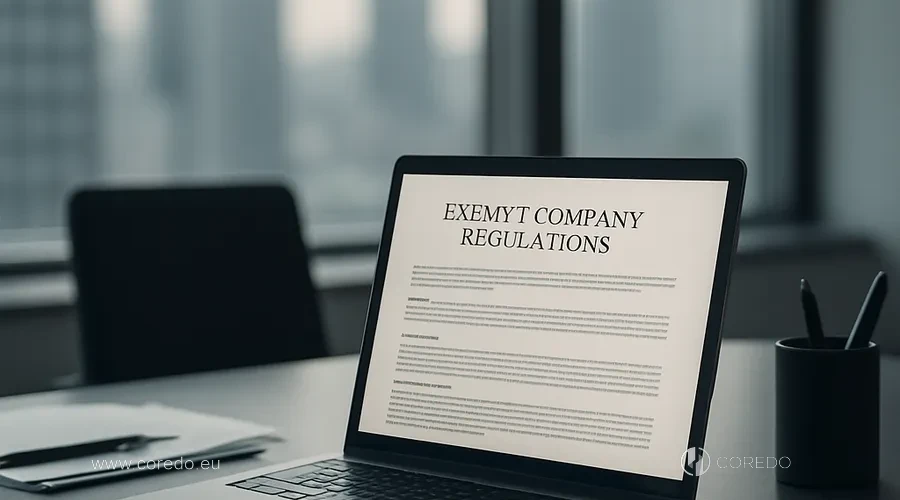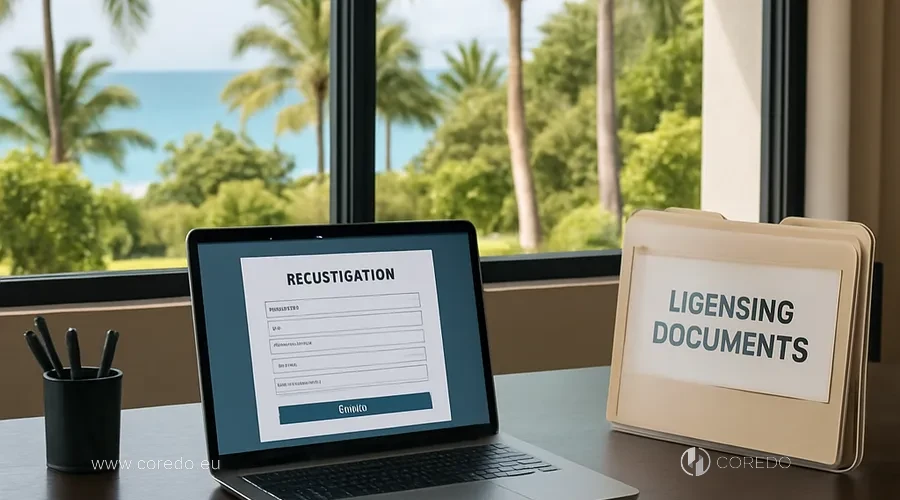
Nikita Veremeev
01.11.2025 | 6 min read
Updated: 01.11.2025
Cayman Exempt Company: is a flexible corporate structure, popular among international businesses due to its unique combination of tax and legal advantages. In this review we will examine the key characteristics and benefits of this form, as well as the features of its legal status and governance that make it a sought-after tool for global investors and entrepreneurs.
Legal status and governance of the Exempt Company

Cayman Islands Exempt Company is a legal entity incorporated under English common law, with an emphasis on stability and predictability of regulation. The governance structure is highly flexible: a single director is sufficient, who may be of any nationality, and meetings may be held outside the Cayman Islands. A solution developed by
COREDO for one of our clients, a European investment fund, allowed integrating an Exempted Company into a global holding structure without the need for physical presence on the islands.
An important advantage: confidentiality. Information about beneficial ownership, directors and shareholders is not disclosed publicly, which protects trade secrets and
investment strategies. At the same time the Cayman Islands Exempt Company complies with international requirements for maintaining the Beneficial Ownership Register, which ensures a balance between privacy protection and transparency.
Tax neutrality and tax guarantees
Key attraction factor: Tax-Neutral Environment. An Exempted Company does not pay corporate tax, income tax, capital gains tax or withholding tax. For international financial transactions this creates unique conditions for effective cash flow management and ROI optimization.
COREDO’s practice confirms: clients can obtain official exemption from local taxes for periods of up to 20–30 years, which guarantees the stability of tax policy and protects businesses from unexpected changes. Nevertheless, it is important to take into account the Economic Substance requirements: the presence of real activity, office premises and staff on the islands. Failure to comply with these requirements may lead to fines and loss of tax benefits.
In one of COREDO’s cases for an Asian family office we implemented economic substance by setting up a local office and hiring qualified personnel. This made it possible not only to comply with the Cayman Islands Economic Substance Requirements but also to increase the trust of banks and partners.
Registration and Licensing of Business in the Cayman Islands

Registration and Licensing of business in the Cayman Islands require compliance with certain legal procedures and impose specific requirements on documentation, the office, and the composition of the company’s participants. At this stage it is important to understand both the basic registration steps and the nuances of licensing — this will ensure successful establishment of the office and fulfillment of all local requirements for operating on the islands.
Therefore, during the registration and licensing stage special attention should be paid to issues related to arranging office space and meeting the applicable organizational requirements.
Office registration: requirements and procedure
The Exempted Company registration process takes 3 to 7 working days, provided the documents are prepared correctly. Required:
- Articles of association and memorandum of incorporation.
- Information about directors and shareholders.
- Confirmation of a registered office in the Cayman Islands.
- KYC documentation and a business plan.
The solution developed by the COREDO team for a European fintech startup included preparing all documentation with consideration of the business specifics and the requirements of international banks, which allowed accounts to be opened without delays.
Licensing of financial services and funds
To carry out activities in the field of financial services, fund management, crypto assets or payment services, it is required to obtain a CIMA Regulatory License. The Cayman Islands Monetary Authority imposes strict requirements on governance structure, internal controls and AML procedures.
COREDO implemented a project for a large private equity fund where a Segregated Portfolio Company (SPC) was created — a structure that allows separating assets and liabilities between portfolios, minimizing risks and providing transparency for investors. For the private fund structure we implemented comprehensive compliance, including automation of financial reporting and integration with international auditors.
Comparison of an Exempt Company and an LLC for investments and assets
| Criterion |
Cayman Islands Exempt Company |
Cayman Islands LLC |
Other offshore jurisdictions |
| Taxation |
No corporate tax |
Subject to corporate tax |
Depends on the jurisdiction |
| Confidentiality |
High |
Medium |
Depends on the jurisdiction |
| Flexibility of structure |
Very high |
High |
Depends on the jurisdiction |
| Substance requirements |
Yes |
Yes |
Depends on the jurisdiction |
| Licensing |
For financial services, yes |
For financial services – yes |
Depends on the jurisdiction |
The main difference is the level of confidentiality and the flexibility of corporate governance. Exempt Company is optimal for international investments, holding structures and asset storage where privacy protection and tax neutrality are important. LLC is more suitable for operating businesses with a limited number of participants and a simpler structure.
The COREDO team recommends choosing a structure based on business goals: for investment funds and international holdings, Exempted Company, for joint ventures and startups: LLC.
Risks and management of a Cayman Islands Exempt Company

Risks and management of a Cayman Islands Exempt Company require special attention to issues of transparency and compliance with local and international regulation. Companies of this type face a number of regulatory and reputational risks that it is important to identify and minimize in a timely manner to maintain the stability and legitimacy of their business.
Regulatory and reputational risks: how to minimize
Global trends show a tightening of requirements for economic substance, transparency and accountability. Jurisdictions that do not meet international standards risk being placed on “blacklists”, which leads to restricted access to banking services and loss of partners’ trust.
COREDO’s practice shows: the key factors in minimizing risks are implementing comprehensive compliance, conducting regular audits and keeping the Beneficial Ownership Register up to date. In one case for an Asian fintech client we integrated automated AML/KYC procedures, which allowed them to pass international banks’ checks and preserve their reputation.
AML and KYC: how to comply with international standards
A Cayman Islands Exempt Company must comply with AML and KYC requirements, maintain a Beneficial Ownership Register and provide financial reporting according to international standards. The solution developed by COREDO for a European asset management fund included integrating automated transaction monitoring systems and preparing reporting for CIMA.
The balance between confidentiality and transparency is achieved through sound corporate governance and the implementation of best practices in compliance.
Banking services and international transfers
Opening bank accounts for offshore structures, a task requiring deep understanding of banks’ requirements and the specifics of international financial operations. COREDO’s experience has shown that the key factor is preparing a complete package of KYC documents, a business plan and evidence of economic substance.
For asset custody, investment management and conducting cross-border transactions, a Cayman Islands Exempt Company provides unique opportunities, allowing the integration of various investment strategies and optimizing the structure for scaling the business.
Thus, proper preparation and
choosing a jurisdiction become decisive for the further development of the business; let’s consider which steps will allow entrepreneurs to increase the efficiency of their companies.
How entrepreneurs can improve their businesses

To understand how to improve business for entrepreneurs, it is important to consider current opportunities to optimize workflows, implement new technologies and continuously develop business skills. Systematic work on efficiency and analysis of key performance indicators allow faster responses to market changes and create competitive advantages for your business.
Key insights and conclusions
- Cayman Islands Exempt Company, an optimal vehicle for international business, investments and asset holding.
- Tax neutrality and guarantees against future taxation provide long-term stability.
- A flexible corporate structure and a high level of confidentiality enable the implementation of complex investment strategies.
- Economic substance requirements and compliance are key to preserving tax benefits and reputation.
Registering a business in the Cayman Islands?
- Define your business objectives and choose the optimal structure: Exempted Company, LLC, SPC or private fund.
- Prepare the incorporation documents, a business plan and KYC information.
- Register the company, ensure the presence of a registered office and compliance with the Economic Substance Requirements.
- Obtain the necessary CIMA licences for financial services and funds.
- Implement comprehensive compliance: AML, KYC, Beneficial Ownership Register, financial reporting.
- Open bank accounts and prepare the infrastructure for international operations.
- Regularly update compliance procedures, conduct audits and monitor changes in legislation.
Conclusion

The Cayman Islands Exempt Company remains one of the most sought-after instruments for international business, investment and asset holding thanks to its unique combination of flexibility, confidentiality and tax neutrality. Regulatory trends require entrepreneurs and investors to pay increased attention to economic substance, transparency and compliance, which makes choosing a reliable partner critically important.
The COREDO team is ready to provide detailed consultation, develop a tailored solution and provide comprehensive support at all stages, from registration to business scaling and optimization of investment strategies. Your success in the global market begins with the right choice of corporate structure and professional support.




